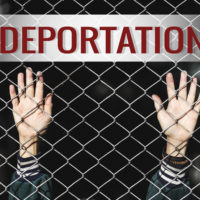Trump’s Deportation Priority List

One of the most prominent and oft-discussed aspects of President-elect Donald Trump’s campaign for the presidency was his hardline stance on illegal immigration. His proposal to build a wall stretching along the U.S./Mexico border, to be funded by the Mexican government, was a frequent talking point. Trump also described his intention when president to deport all those who were in the country without documentation, though the latter policy point was less consistent. As Trump pieces together a cabinet and begins fleshing out plans of action for his imminent presidential term, he has gone into greater detail on which of the millions of undocumented persons in the US he plans to deport first.
In an interview on the CBS show 60 Minutes, Trump explained that his first priority would be deporting those in the US without authorization who have a record with the justice system. “What we are going to do is get the people that are criminal and have criminal records, gang members, drug dealers, where a lot of these people, probably 2 million, it could be even 3 million, we are getting them out of our country or we are going to incarcerate. But we’re getting them out of our country, they’re here illegally.”
According to immigration experts, the figures cited by Trump do not line up with the populations of immigrants Trump describes as needing to be removed. A report from the Migration Policy Institute estimates that roughly 820,000 individuals in the US would be included on the priority deportation list, as described by Trump. This number represents what the Institute estimates is the current population of persons who are not lawfully present in the US who have criminal records. The Department of Homeland Security’s most recent report on this issue enumerated 1.9 million non-citizens with criminal records that made them eligible for deportation. However, this number included both those who were lawfully and unlawfully-present, and even that number has been reduced by subsequent deportations.
After those with criminal records are incarcerated or deported, the priority of immigration enforcement will become the construction of a wall. Mexican government officials have repeatedly said that they will not contribute funds to the construction of a wall, and a member of the Trump transition team called the wall “a great campaign device.” Trump said that a portion of the border barrier will indeed be a wall, where appropriate, but that some portions might be secured with fencing. Republican members of Congress have previously proposed a wall/fence hybrid for use along the border.
Only once the border is secure and “after everything gets normalized,” said Trump, will the administration begin to assess whether those without criminal records who are in the country without authorization will be allowed to stay. Meanwhile, many questions still remain regarding Trump’s ultimate policies on undocumented US residents.
If you would like assistance in applying for legal permanent residence or US citizenship, seek assistance from a skilled and experienced attorney as soon as possible, and contact the Queens law offices of Gladstein & Messinger for a consultation, at 718-793-7800.

